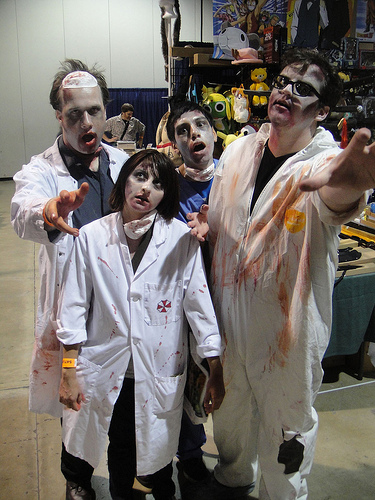A Two Way Street: Science and Pop Culture
 What do zombies and science have in common? A lot these days, it would seem, as I tried to describe in a recent Scientific American Guest Blog posted I penned on zombies and culture.
What do zombies and science have in common? A lot these days, it would seem, as I tried to describe in a recent Scientific American Guest Blog posted I penned on zombies and culture.
As I pointed out in that blog post, although scientists and science communicators often see opportunities for science education through popular culture icons, and talk about how science has influenced films, video games, books, etc., I think there has long been a force in the other direction that scientists don't always acknowledge.
What young, future scientist wasn't inspired by comic books and science fiction? I know that I read Ray Bradbury's Martian Chronicles, Robert A. Heinlein, H. G. Wells and Jules Verne long before I began my formal scientific training. There is no denying that science fiction has often inspired future great scientists.
Link: How does science fiction influence scientific research?
How many times have we seen the science fiction of movies and books turned into science fact, realized by scientists inspired by the imaginations of the past?
I think it is fascinating that our imaginations often drive our scientific research. Most scientists will be careful to say that their research is driven by reason and objective evidence alone, but I believe I beg to differ. Is it a coincidence that many of the technologies envisioned by the great science fiction writers of the past are being realized today? Self-driving cars, Back to the Future inspired carbon-based fuel cells, invisibility cloaks, even moon landings and adventures to the bottom of the sea. In some cases, science fiction writers may simply have a talent in extrapolating current science and technology to future inventions. But other times, is it not possible that stuff of pure imagination has driven scientists to pursue research in a particular area, just because they crave the challenge to turn fiction into reality?
Of course, the actual science often turns out to be very different from what science fiction writers envisioned. But if we couldn't imagine and envision it, would it have even been pursued by actual science?
I think public imagination has inspired science and technology in new areas that might not have been explored if some writer of film-maker hadn't had the creative mind to imagine it. In the end, every scientific invention, and even every scientific experiment, started out as a thought in somebody's mind, whether writer, artist or trained scientist.
Link: The Science Fiction Stories that Inspire and Hinder Real Science
I'm very interested in finding more examples of science and technology that lived in science fiction before research turned them into reality. If you can think of any examples, please comment here! If you have any special insight on how science fiction has inspired scientific research, and you'd like to contribute to an article I am working on, please e-mail me at pbrow11[at]tigers.lsu.edu!
